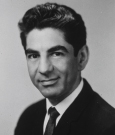The 1964 Surgeon General’s Report on Smoking and Health started a culture change in the way Americans viewed tobacco and their health, and has saved countless million of lives. But the 1964 Report remained scientifically ambiguous on certain vital issues, such as the effect smoking had on the unborn child. This was a crucial issue, as Big Tobacco had targeted America’s women as a growing source of new smokers, playing down harms associated with smoking while pregnant.
In 1971, then Surgeon General Jesse L. Steinfeld, MD, took Big Tobacco to task, stating, “Let me suggest that certain purveyors of cigarettes stop making remarks about how some young mothers in childbirth might welcome smaller babies. The mother who smokes is subjecting the unborn child to the adverse effects of tobacco, and as a result we are losing babies and possibly handicapping babies.”
Dr. Steinfeld died on August 5, 2014, at the age of 87.
Education and Early Career
The son of Jewish immigrants from Hungary, Dr. Steinfeld was born on January 6, 1927, in the Pittsburgh suburb of West Aliquippa, deep in coal country. When he was 5 years old, his father, a lifelong smoker, died of lung cancer.
Boys in his social class were routinely placed in vocational tracks that often led to the coal mines. However, Dr. Steinfeld persuaded his counselor to put him on an academic track instead; he graduated high school with honors at age 16 and received his bachelor’s degree 19 months later from the University of Pittsburgh in 1945.
Dr. Steinfeld earned his MD in 1949 from Western Reserve University, now called Case Western Reserve University, in Cleveland. He then did his internship at Cedars of Lebanon Hospital in Los Angeles and his residencies at the Veterans Administration Hospital in Long Beach, California, and at the University of California, where he studied oncology.
In 1954, Dr. Steinfeld took a position at the National Cancer Institute (NCI), serving as Director of the Radioisotope Laboratory until 1958. In 1959, he returned to California, where he joined the faculty of the University of Southern California School of Medicine, serving as Assistant Professor of Medicine, rising to Associate Professor in 1963, and full professorship in 1967. During this period, most of his research focused on cancer.
Dr. Steinfeld returned to the NCI in 1968, serving as Associate Director for Programs. Later that same year, he was appointed Deputy Assistant Secretary for Health and Scientific Affairs, and on December 18, 1969, he became the U.S. Surgeon General. During his tenure as Surgeon General, Dr. Steinfeld also served as ASCO’s seventh President, from 1970 to 1971.
Antismoking Passion
For various political reasons prior to his appointment, the Surgeon General’s position had been watered down, operating without a clear line of authority. But that changed with Dr. Steinfeld, who embraced the role of public-figure activist. His antitobacco stance was bold and unequivocal, leading him to become Big Tobacco’s worst enemy. Remarkably, his two predecessors had been smokers. Dr. Steinfeld removed all the ashtrays and placed no-smoking signs in his offices, an unheard of move against the status quo in that era.
Dr. Steinfeld’s antismoking passion led him into uncharted waters. Citing numerous studies showing that women were less likely than men to quit smoking, he spearheaded a campaign to reduce the number of female smokers. He spoke liberally without mincing words about how Big Tobacco cleverly marketed cigarettes to women, even pregnant women, despite the deleterious effects on the fetus.
He was also at an unpopular vanguard, warning against the dangers of secondhand smoke. Many of his ideas about banning smoking on airplanes, trains, restaurants, the workplace, and other public places would take hold decades later as antismoking activists lobbied for and achieved smoke-free zones. But at the time, they were considered radical.
Not surprisingly, Big Tobacco attacked him. In 1972, the President of R.J. Reynolds wrote to Elliot Richardson, the Secretary of Health, Education, and Welfare: “The results of public misinformation are evident. Public transportation, for example, is beset with no-smoking policies on the basis of the Surgeon General’s arbitrary campaign to ban all smoking.”
Undaunted Zeal
Dr. Steinfeld remained undaunted in his zeal for public health. Besides his nonstop vigorous antismoking campaign, he also spoke out about what he regarded as a negative influence on children—violence on television. His call for networks to impose certain types of self-censorship or to at least give parental warnings about violent programs drew heavy criticism, which also attracted the ire of the Nixon administration.
His superiors ordered him not to testify before Congress on the television violence issue, but true to form, Dr. Steinfeld testified without clearing his remarks first. This latest move against the industry created a firestorm. When Nixon was reelected in 1972, he asked certain members of his administration to submit letters of resignation. Dr. Steinfeld’s letter, which needed to be rewritten several times to dilute its power, was finally accepted.
Following his forced resignation, Dr. Steinfeld spent a year at the Mayo Clinic and 2 years at the University of California, Irvine. From 1976 to 1983, Dr. Steinfeld served as Dean at the Medical College of Virginia School of Medicine. He became President of the Medical College of Georgia in 1983.
Health-related issues led to his retirement in 1987, but he remained a strong public advocate for nonsmoker’s rights. In 1971, Dr. Steinfeld publically stated before Congress, “It is high time to ban smoking from all public places…. It is time we interpret the Bill of Rights for the nonsmoker as well as the smoker.”
Lest we forget, our public health has greatly improved because of courageous physicians like Dr. Steinfeld. He is survived by three daughters, two grandchildren, and his wife of more than 61 years, the former Gen M. Stokes. ■


